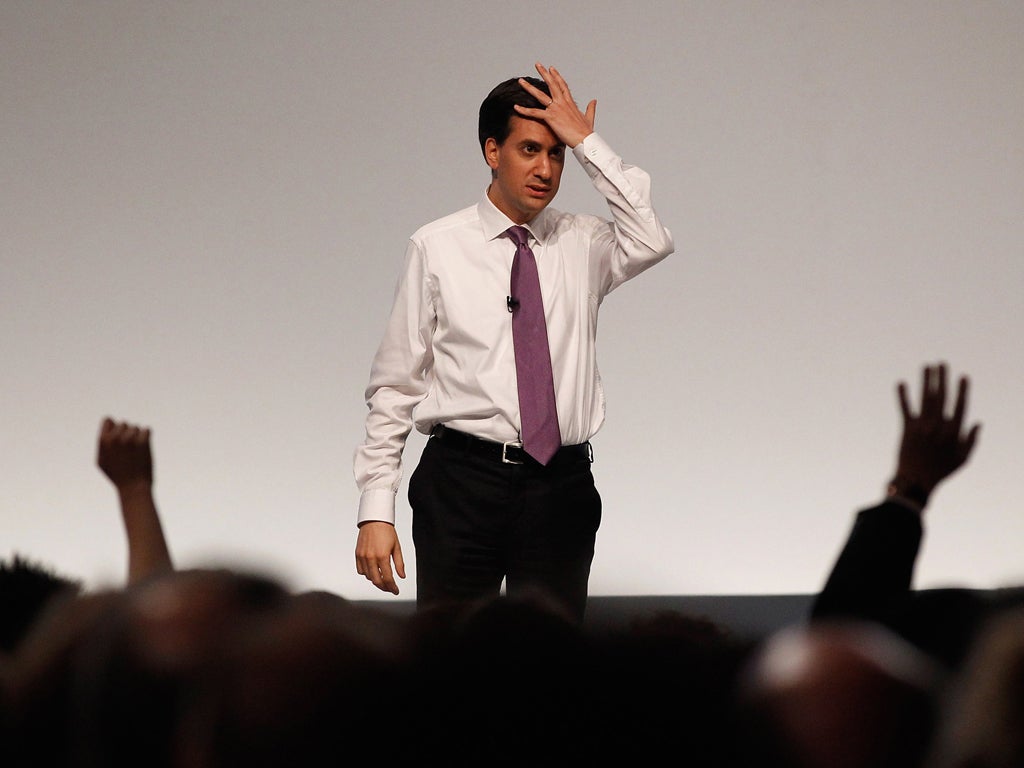Andrew Grice: Never mind the speeches, there are still no obvious winners

Watching Ed Miliband's Labour conference speech on television, David Cameron judged it "a left-wing lecture". As the Labour leader vowed to use the tax and regulatory systems to slay the "predators" exploiting Britain's "fast-buck" culture, sources close to Mr Cameron say he believes Mr Miliband made a fatal error: in a global economic crisis, politicians should help business, not attack it.
Senior Conservatives cheered too when an unfortunate pause in Mr Miliband's speech allowed some delegates to cheer him for saying he is "not Tony Blair" and boo the mention of Mr Blair's name. As one Tory minister put it: "If Labour turns its back on Blair, it can wave goodbye to Middle England – and the next election."
Naturally, most Blairites didn't like the Miliband speech, even though the Labour leader did not intend to attack his predecessor-but-one. "We've gone back to John Smith," one downcast Blairite told me. Mr Smith, the Labour leader who died in 1994, would almost certainly have led his party to victory in 1997 because the Tories had lost their economic credentials, though probably would not have won New Labour's landslide. Mr Smith was a social democrat whose cautious approach to modernisation frustrated Mr Blair and Gordon Brown.
He would have liked this week's Miliband speech. Mr Smith promised full employment, was reluctant to curb trade union power and as shadow Chancellor proposed higher taxes and spending, contributing to Labour's 1992 election defeat.
It is no coincidence that a year ago, in the same Liverpool conference hall in which Mr Miliband spoke, Vince Cable set out what he regards as a milder, more pragmatic version of "responsible capitalism". The Liberal Democrat Business Secretary was once an adviser to ... the same John Smith.
For the most part, Mr Blair and Mr Brown preferred to keep off the backs of business, content to use tax revenues from a lightly-regulated City of London to boost spending on public services. If Mr Miliband can flesh out his theme – a big "if"– a future Labour Government would act very differently. First, of course, he must persuade the voters, and this is an even bigger "if". There is little evidence that people in other European countries have turned to the state for solutions since the 2008 financial crisis. You can count the number of centre-left governments on the fingers of one hand.
Yet I suspect Tory ministers underestimate Mr Miliband. The Labour leader is gambling on the public mood being different after the 2008 crash and the squeeze on living standards it has caused. He calculates that the Tories are fighting the last war, and that the public may be more interested in his "new bargain" than his opponents judge. He has bet the farm on it. But the Tories cannot assume he will lose. As the Tories gather in Manchester this weekend, the question on many minds will be how to win an outright majority next time. It would be lazy and dangerous to rely on Mr Miliband to deliver the prize; the Tories will have to earn it.
Polling commissioned by Lord Ashcroft, the former deputy Tory chairman, found that Mr Cameron's party scores well on being "willing to take tough decisions for the long term" (59 per cent) but poorly on being "on the side of ordinary people" (27 per cent). Labour is behind on taking tough decisions (38 per cent), but it is ahead on being on the side of ordinary people (45 per cent).
There is a similar pattern in Tory-held marginals. So the public is not persuaded by George Osborne's "we're all in it together" mantra. No doubt this problem will be addressed in Manchester. In the run-up, ministers have trailed "real world" announcements – on rubbish collection, NHS out-of-hours cover and speed limits to show they understand ordinary people's lives. The conference will see policies designed to show the Tories are on the side of our old friend –"hard-working families" who play by the rules. "People think we stand for cuts, cuts and more cuts," one Tory adviser admitted.
So, while ministers announce crackdowns on people who abuse the system, the conference will also showcase a "modern compassionate Conservatism". The big worry in Downing Street is that the Liberal Democrats get the credit for softening the rough edges of the nasty party, leaving Mr Cameron vulnerable to the "same old Tories" fear which prevented him winning last year.
Join our commenting forum
Join thought-provoking conversations, follow other Independent readers and see their replies
Comments
Bookmark popover
Removed from bookmarks